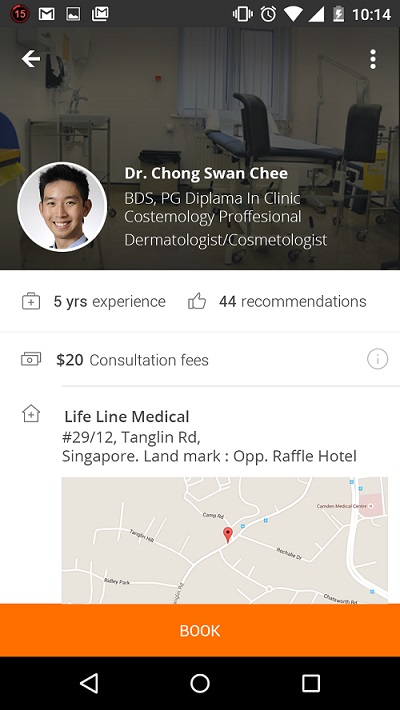Indian healthcare startup Practo looks SEA-wards
By Benjamin Cher September 21, 2015
- Already in three SEA countries, launching Malaysia ops soon
- Allows doctors to manage their practice, on the cloud

SOUTH-East Asia looks to be pretty much a key overseas market for Bangalore-headquartered startup Practo, which is already in Indonesia, the Philippines and Singapore, with its Malaysian operations set to launch next month.
Since its inception 2008, Practo has grown quickly, expanding from six to 35 cities in India, and venturing overseas to South-East Asia.
This is just the tip of its plans, and with a recently concluded Series C round which raised US$90 million, it is set to continue its global expansion. It targets to be in 10 countries across South-East Asia, Eastern Europe, the Middle East and Latin America.
Practo is also looking domestically in India to hit 100 cities within 12 months, according to its assistant vice president of marketing Varun Dubey.
There are many other healthcare startups, from as DocDoc which provides an online platform to find and book appointments with doctors, to RingMD, which allows patients to have a video appointment from their own home.
However, few are targeted at helping doctors, which is what Practo has done, Varun said.
Its Practo Ray helps doctors create and maintain digital patient records, as well as handle the nitty-gritty in running their clinics – all in the cloud, with an ‘as-a-Service’ business model.
It also has a consumer-facing product, its healthcare search and appointment-booking platform Practo Search, which offers verified customer reviews of medical professionals.
Practo was born because founder and chief executive officer Shashank ND could not get his father’s medical records electronically, according to Varun.
“He [Shashank] wanted to send his father’s medical records to the United States, and was surprised that he couldn’t get it sent to him via email,” Varun told Digital News Asia (DNA) in Singapore.
Birth pangs
Practo faced challenges at the start, especially as it was catering to doctors at first, a niche which few startups venture into.
“The big challenge for us has been to get doctors to understand what we do,” Varun said.
Citing Singapore as an example, Varun said Practo had to spend time learning the market, which is very different from other markets in South-East Asia.
“Once the doctors understood what Practo does, we saw a lot of interest from them,” he added.
The startup now sees more adoption among doctors in Singapore according to Varun, and the challenge now is in scaling operations to meet demand.
“After adoption, our next challenge in Singapore was how quickly we could scale,” Varun said.
“The customers in Singapore came and essentially flooded us from a technology perspective, and we had to move quickly to keep up with the demand they had,” he claimed.
Singapore doctors were using the entire gamut of what Practo offers, from medical images and digital records to prescriptions, “digital everything,” as Varun put it.
To address their concerns about cloud-based access, Practo developed IP (Internet Protocol) and geo-locks on where customers can log in from.
 A geo-lock only allows access to an application or database from within preset geographical parameters.
A geo-lock only allows access to an application or database from within preset geographical parameters.
Surprisingly, healthcare regulations and compliance have not been an issue for Practo, according to Varun.
“We really haven’t faced that many of that kind of hurdles in Singapore,” he said.
Such challenges have not slowed the momentum of its patient-facing product, Practo Search, which Varun claimed was Asia’s largest such platform, with over 200,000 healthcare professionals and 10 million searches a month.
“We are the largest platform in Singapore by like a mile, with 500,000 patients being managed by our software, which is about 10% of the population here,” he said.
‘Patients’ here refer to both users of Practo Search, and the patients of doctors who are using Practo.
The startup currently lists about 5,500 to 6,000 Singapore medical professional on its search, which is about 80% of the doctors in the country. Varun hopes to extend that to 100% and list the hospitals in Singapore as well.
Growth and expansion
Practo currently has over 1,500 employees, with about 40 of them in Singapore. While the main coding team is based in India, each country has operations and sales teams to keep the wheels spinning, according to Varun.
“We do not charge doctors to list, and that’s why we have a completely separate ops team which sign doctors up and verify records,” he said.
“With every country we launch in, we are very clear we have a local presence,” he added.
When asked about which countries in South-East Asia it is launching in, Varun said that Practo is identifying these markets, with Malaysia already on the cards.
“We are launching in Malaysia next month, and our team is already in place,” Varun said.
This will pretty much remain the game-plan until March 2016. “We want to concentrate on expanding our products and cover the entirety of the countries we are currently based in,” he added.
Practo is also branching into the fitness market, with the idea of helping users maintain their physical well-being, which explains its acquisition of fitness platform FitHo and app developer Genii.
On Sept 14, it also acquired Insta Health for US$12 million, bringing hospital information expertise to its portfolio. There are more such acquisitions in the pipeline, according to Varun.
“We want to make sure that we can work with anyone who has a great product and can retain talent,” he said.
UPDATE: On Sept 25, Practo announced the acquisition of hospital appointment scheduling company Qikwell for an undisclosed sum, boosting Practo’s own appointment booking platform to nearly 40 million appointments managed every year.
While Practo is not looking for any further funding in the near future, with the recent closure of its Series C, there were some questions about the short duration between its Series B and C rounds. It had raised US$30 million in its Series B round only in February.
“We actually closed our Series B about a month earlier than when we announced it, giving us about six months between the two rounds,” Varun said.
“We actually accelerated out growth – for example, between Series B and C, we grew from 400 to 1,600 people.
“The speed at which we want to grow is what drives us to get funding – also, with our new investors, we get diverse expertise, and that’s the real reason why we seek funding,” he declared.
Related Stories:
Singapore startup, by Indian nationals for India, gets US$440K in funding
Klinify out to cure medical paperwork pains
Healthcare IT spending in Asia to grow 8% annually till 2018: IDC
How mobility can be a game-changer for healthcare
For more technology news and the latest updates, follow us on Twitter, LinkedIn or Like us on Facebook.


